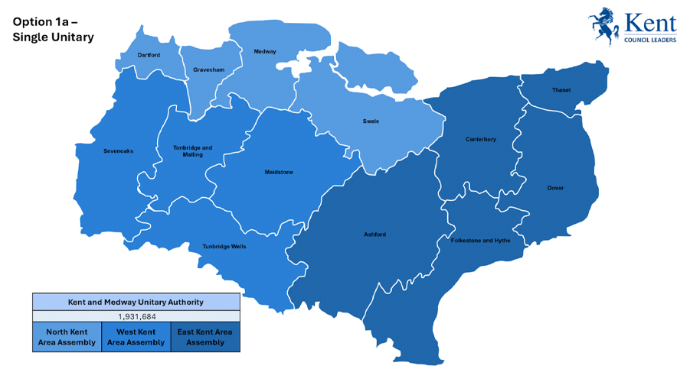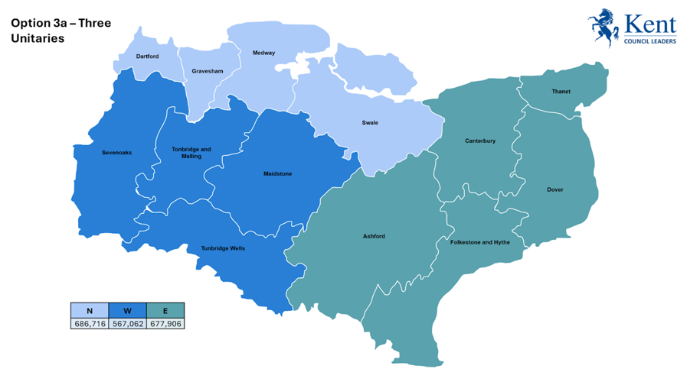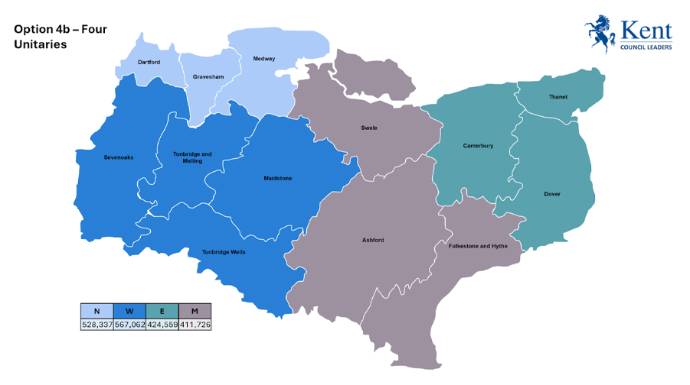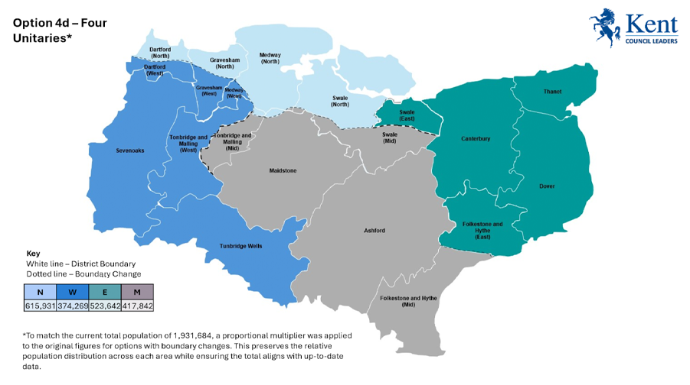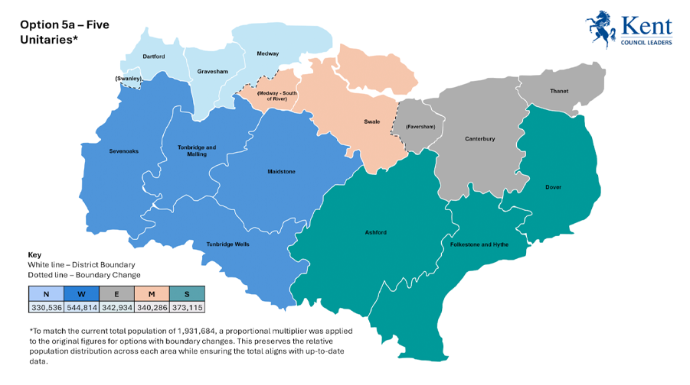To: Leaders of two-tier councils and unitary council in Kent
Ashford Borough Council
Canterbury City Council
Dartford Borough Council
Dover District Council
Folkstone and Hythe District Council
Gravesham Borough Council
Kent County Council
Maidstone Borough Council
Sevenoaks District Council
Swale Borough Council
Thanet District Council
Tonbridge and Malling Borough Council
Tunbridge Wells Borough Council
Medway Council
From: Jim McMahon OBE MP
Minister of State for Local Government and English Devolution
5 February 2025
Dear Leaders
This government has been clear on our vision for simpler, more sustainable, local government structures, alongside a transfer of power out of Westminster through devolution. We know that councils of all political stripes are in crisis after a decade of decline and instability. Indeed, a record number of councils asked the government for support this year to help them set their budgets.
This new government will not waste this opportunity to build empowered, simplified, resilient and sustainable local government for your area that will increase value for money for council taxpayers. Local leaders are central to our mission to deliver change for hard-working people in every corner of the country through our Plan for Change, and our councils are doing everything they can to stay afloat and provide for their communities day in, day out. The government will work closely with you to deliver these aims to the most ambitious timeline.
I am writing to you now to formally invite you to work with other council leaders in your area to develop a proposal for local government reorganisation, and to set out further detail on the criteria, guidance for the development of proposals, and the timeline for this process. A formal invitation with guidance for the development of your proposals is attached at Annex A. This invitation sets out the criteria against which proposals will be assessed.
Developing proposals for reorganisation
We expect there to be different views on the best structures for an area, and indeed there may be merits to a variety of approaches. Nevertheless, it is not in council taxpayers’ interest to devote public funds and your valuable time and effort into the development of multiple proposals which unnecessarily fragment services, compete against one another, require lengthy implementation periods or which do not sufficiently address local interests and identities.
The public will rightly expect us to deliver on our shared responsibility to design and implement the best local government structures for efficient and high-quality public service delivery. We therefore expect local leaders to work collaboratively and proactively, including by sharing information, to develop robust and sustainable unitary proposals that are in the best interests of the whole area to which this invitation is issued, rather than developing competing proposals.
This will mean making every effort to work together to develop and jointly submit one proposal for unitary local government across the whole of your area. The proposal that is developed for the whole of your area may be for one or more new unitary councils and should be complementary to devolution plans. It is open to you to explore options with neighbouring councils in addition to those included in this invitation, particularly where this helps those councils to address concerns about their sustainability or limitations arising from their size or boundaries or where you are working together across a wider geography within a strategic authority.
I understand there will be some cases when it is not possible for all councils in an area to jointly develop and submit a proposal, despite their best efforts. This will not be a barrier to progress, and the government will consider any suitable proposals submitted by the relevant local authorities.
Supporting places through change
It is essential that councils continue to deliver their business-as-usual services and duties, which remain unchanged until reorganisation is complete. This includes progress towards the government’s ambition of universal coverage of up-to-date local plans as quickly as possible. To support with capacity, I intend to provide some funds for preparing to take forward any proposal, and I will share further information later in the process.
Considering the efficiencies that are possible through reorganisation, we expect that areas will be able to meet transition costs over time from existing budgets, including from the flexible use of capital receipts that can support authorities in taking forward transformation and invest-to-save projects.
The default position is that assets and liabilities remain locally managed by councils, but we acknowledge that there are exceptional circumstances where there has been failure linked to capital practices. Where that is the case, proposals should reflect the extent to which the implications of this can be managed locally, including as part of efficiencies possible through reorganisation, and Commissioners should be engaged in these discussions. We will continue to discuss the approach that is proposed with the area.
I welcome the partnership approach that is being taken across the sector to respond to the ambitious plans set out in the White Paper. My department will continue to work closely with the Local Government Association (LGA), the District Councils Network, the County Councils Network and other local government partners to plan how best to support councils through this process. We envisage that practical support will be needed to understand and address the key thematic issues that will arise through reorganisation, including managing service impacts and opportunities for the workforce, digital and IT systems, and leadership support.
Timelines and next steps for interim plans and full proposals
We ask for an interim plan to be submitted on or before 21 March 2025, in line with the guidance set out in the attached Annex. My officials will provide feedback on your plan to help support you to develop final proposals.
I will expect any full proposal to be submitted by 28 November. If I decide to implement any proposal, and the necessary legislation is agreed by Parliament, we will work with you to move to elections to new ‘shadow’ unitary councils as soon as possible as is the usual arrangement in the process of local government reorganisation.
Following submission, I will consider any and all proposals carefully before taking decisions on how to proceed. My officials are available throughout to discuss how your reorganisation and devolution aspirations might work together and what support you think you might need to proceed.
This is a once in a generation opportunity to work together to put local government in your area on a more sustainable footing, creating simpler structures for your area that will deliver the services that local people and businesses need and deserve. As set out in the White Paper, my commitment is that clear leadership locally will be met with an active partner nationally.
I am copying this letter to council Chief Executives. I am also copying this letter to local Members of Parliament and to the Police and Crime Commissioner.
Yours sincerely,
Jim McMahon OBE MP
Minister of State for Local Government and English Devolution
Annex A
Local Government and Public Involvement in Health Act 2007
Invitation for proposals for a single-tier of local government
The Secretary of State for Housing, Communities and Local Government, in exercise of his powers under Part 1 of the Local Government and Public Involvement in Health Act 2007 (‘the 2007 Act’), hereby invites any principal authority in the area of the county of Kent, to submit a proposal for a single tier of local government.
This may be one of the following types of proposal as set out in the 2007 Act:
- Type A – a single tier of local authority covering the whole of the county concerned
- Type B – a single tier of local authority covering an area that is currently a district, or two or more districts
- Type C – a single tier of local authority covering the whole of the county concerned, or one or more districts in the county; and one or more relevant adjoining areas
- Combined proposal – a proposal that consists of two or more Type B proposals, two or more Type C proposals, or one or more Type B proposals and one or more Type C proposals.
Proposals must be submitted in accordance with paragraphs 1 to 3:
1. Any proposal must be made by 28 November 2025.
2. In responding to this invitation an authority must have regard to the guidance from the Secretary of State set out in the Schedule to this invitation, and to any further guidance on responding to this invitation received from the Secretary of State.
3. An authority responding to this invitation may either make its own proposal or make a proposal jointly with any of the other authorities invited to respond.
Signed on behalf of the Secretary of State for Housing, Communities and Local Government.
F Kirwan
A senior civil servant in the Ministry of Housing, Communities and Local Government
5 February 2025
Schedule
Guidance from the Secretary of State for proposals for unitary local government.
Criteria for unitary local government
1. A proposal should seek to achieve for the whole of the area concerned the establishment of a single tier of local government.
a) Proposals should be for sensible economic areas, with an appropriate tax base which does not create an undue advantage or disadvantage for one part of the area.
b) Proposals should be for a sensible geography which will help to increase housing supply and meet local needs.
c) Proposals should be supported by robust evidence and analysis and include an explanation of the outcomes it is expected to achieve, including evidence of estimated costs/benefits and local engagement.
d) Proposals should describe clearly the single tier local government structures it is putting forward for the whole of the area, and explain how, if implemented, these are expected to achieve the outcomes described.
2. Unitary local government must be the right size to achieve efficiencies, improve capacity and withstand financial shocks.
a) As a guiding principle, new councils should aim for a population of 500,000 or more.
b) There may be certain scenarios in which this 500,000 figure does not make sense for an area, including on devolution, and this rationale should be set out in a proposal.
c) Efficiencies should be identified to help improve councils’ finances and make sure that council taxpayers are getting the best possible value for their money.
d) Proposals should set out how an area will seek to manage transition costs, including planning for future service transformation opportunities from existing budgets, including from the flexible use of capital receipts that can support authorities in taking forward transformation and invest-to-save projects.
e) For areas covering councils that are in Best Value intervention and/or in receipt of Exceptional Financial Support, proposals must additionally demonstrate how reorganisation may contribute to putting local government in the area as a whole on a firmer footing and what area-specific arrangements may be necessary to make new structures viable.
f) In general, as with previous restructures, there is no proposal for council debt to be addressed centrally or written off as part of reorganisation. For areas where there are exceptional circumstances where there has been failure linked to capital practices, proposals should reflect the extent to which the implications of this can be managed locally, including as part of efficiencies possible through reorganisation.
3. Unitary structures must prioritise the delivery of high quality and sustainable public services to citizens.
a) Proposals should show how new structures will improve local government and service delivery, and should avoid unnecessary fragmentation of services.
b) Opportunities to deliver public service reform should be identified, including where they will lead to better value for money.
c) Consideration should be given to the impacts for crucial services such as social care, children’s services, SEND and homelessness, and for wider public services including for public safety.
4. Proposals should show how councils in the area have sought to work together in coming to a view that meets local needs and is informed by local views.
a) It is for councils to decide how best to engage locally in a meaningful and constructive way and this engagement activity should be evidenced in your proposal.
b) Proposals should consider issues of local identity and cultural and historic importance.
c) Proposals should include evidence of local engagement, an explanation of the views that have been put forward and how concerns will be addressed.
5. New unitary structures must support devolution arrangements.
a) Proposals will need to consider and set out for areas where there is already a Combined Authority (CA) or a Combined County Authority (CCA) established or a decision has been taken by Government to work with the area to establish one, how that institution and its governance arrangements will need to change to continue to function effectively; and set out clearly (where applicable) whether this proposal is supported by the CA/CCA /Mayor.
b) Where no CA or CCA is already established or agreed then the proposal should set out how it will help unlock devolution.
c) Proposals should ensure there are sensible population size ratios between local authorities and any strategic authority, with timelines that work for both priorities.
6. New unitary structures should enable stronger community engagement and deliver genuine opportunity for neighbourhood empowerment.
a) Proposals will need to explain plans to make sure that communities are engaged.
b) Where there are already arrangements in place it should be explained how these will enable strong community engagement.
Developing proposals for unitary local government
The following matters should be taken into account in formulating a proposal:
Boundary Changes
a) Existing district areas should be considered the building blocks for your proposals, but where there is a strong justification more complex boundary changes will be considered.
b) There will need to be a strong public services and financial sustainability related justification for any proposals that involve boundary changes, or that affect wider public services, such as fire and rescue authorities, due to the likely additional costs and complexities of implementation.
Engagement and consultation on reorganisation
a) We expect local leaders to work collaboratively and proactively, including by sharing information, to develop robust and sustainable unitary proposals that are in the best interests of the whole area to which this invitation is issued, rather than developing competing proposals.
b) For those areas where Commissioners have been appointed by the Secretary of State as part of the Best Value Intervention, their input will be important in the development of robust unitary proposals.
c) We also expect local leaders to engage their Members of Parliament, and to ensure there is wide engagement with local partners and stakeholders, residents, workforce and their representatives, and businesses on a proposal.
d) The engagement that is undertaken should both inform the development of robust proposals and should also build a shared understanding of the improvements you expect to deliver through reorganisation.
e) The views of other public sector providers will be crucial to understanding the best way to structure local government in your area. This will include the relevant Mayor (if you already have one), Integrated Care Board, Police (Fire) and Crime Commissioner, Fire and Rescue Authority, local Higher Education and Further Education providers, National Park Authorities, and the voluntary and third sector.
f) Once a proposal has been submitted it will be for the government to decide on taking a proposal forward and to consult as required by statute. This will be a completely separate process to any consultation undertaken on mayoral devolution in an area, which will be undertaken in some areas early this year, in parallel with this invitation.
Interim plans
An interim plan should be provided to government on or before 21 March 2025. This should set out your progress on developing proposals in line with the criteria and guidance. The level of detail that is possible at this stage may vary from place to place but the expectation is that one interim plan is jointly submitted by all councils in the area. It may be the case that the interim plan describes more than one potential proposal for your area, if there is more than one option under consideration. The interim plan should:
a) identify any barriers or challenges where further clarity or support would be helpful.
b) identify the likely options for the size and boundaries of new councils that will offer the best structures for delivery of high-quality and sustainable public services across the area, along with indicative efficiency saving opportunities.
c) include indicative costs and arrangements in relation to any options including planning for future service transformation opportunities.
d) include early views as to the councillor numbers that will ensure both effective democratic representation for all parts of the area, and also effective governance and decision-making arrangements which will balance the unique needs of your cities, towns, rural and coastal areas, in line with the Local Government Boundary Commission for England guidance.
e) include early views on how new structures will support devolution ambitions.
f) include a summary of local engagement that has been undertaken and any views expressed, along with your further plans for wide local engagement to help shape your developing proposals.
g) set out indicative costs of preparing proposals and standing up an implementation team as well as any arrangements proposed to coordinate potential capacity funding across the area.
h) set out any voluntary arrangements that have been agreed to keep all councils involved in discussions as this work moves forward and to help balance the decisions needed now to maintain service delivery and ensure value for money for council taxpayers, with those key decisions that will affect the future success of any new councils in the area.
